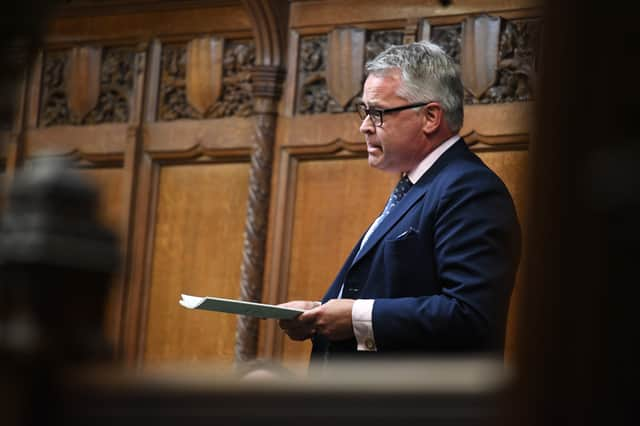Words Matter: two in five children experience harmful verbal abuse from adults, new charity research finds
and live on Freeview channel 276
Two in five children experience harmful verbal abuse from adults, new research has found.
The study, commissioned by new charity Words Matter, found that of those, more than half experienced the hurtful language every week, while one in 10 were abused on a daily basis. Researchers spoke to more than 1,000 children aged 11 to 17. They revealed the main perpetrators to be parents, carers, teachers and parents of friends.
Advertisement
Hide AdAdvertisement
Hide AdWords Matter, which aims to improve children's mental health by ending verbal abuse, says an increasing amount of scientific research shows these kind of insults have the potential to damage a child for a lifetime. It can affect their self-esteem and confidence, their future potential, and ability to function at home, school, the workplace and in social situations. Childhood verbal abuse can change the brain and lead to a variety of issues including anxiety, depression, eating disorders, self-harm, substance abuse and even suicide.
One child told the researchers: "I carry this fear with me that everything adults say about me is true. What the grown-ups say affects my self-worth every day and every relationship I have. I constantly worry that anyone I meet will think I am a horrible person and leave me."


Jessica Bondy, the founder of Words Matter who suffered verbal abuse during her childhood, is trying to get this issue recognised as a viable form of abuse that affects all of us.
“I don’t want another child on this planet to be impacted by the harsh words of adults as it can affect them for a lifetime, like it has me," she said. "It is in all our interests to think about how we talk to children to give them the best start in life – if you respect a child, they will respect themselves and others.”
Advertisement
Hide AdAdvertisement
Hide AdSenior Tory MP Tim Loughton, who chairs the APPG for children, commented: "Whilst we are all too familiar with the damage done to children as those most likely to be the victims of physical violence everyday, psychological abuse is a more insidious and all-encompassing influence impacting most on those whose mental health has already been greatly undermined because of the Covid pandemic.
"We all have a duty of care to treat children with care and respect and that includes the words and phrases we use whether it is in the home or in school. This initiative is an important initiative to remind us all that words matter and when used wrongly can have significant implications for children.”


What is verbal abuse and how can we recognise it?
Words Matter defines verbal abuse as “negative words and language that cause harm”. The charity emphasises that this form of abuse is not necessarily loud or violent but can be subtle and go unnoticed. This can include the use of upsetting and negative language to blame, belittle, ridicule, demean or threaten a child and can be impacted by tone, volume and facial expressions.
Verbal abuse can be detrimental to a child’s wellbeing and development into adulthood. It can reduce a child’s self-esteem at home and in social and professional environments, leading to issues such as anxiety, depression and self-harm.
Advertisement
Hide AdAdvertisement
Hide AdProf Peter Fonagy, head of psychology and language sciences department at UCL, said the charity is tackling “one of the most critical issues affecting children.”
“What children hear when they grow up is vital to forming strong and healthy relationships with themselves and those around them. All children need positive, supportive words, to develop trust, emotional security, their identity, and self-respect. Words matter.”
How does Words Matter aim to help?
Words Matter’s mission is for child verbal abuse to be taken seriously, inspiring action and change in the process. Through partnering with global experts, commissioning research and collaborating with both victims and decision makers, the ambitious organisation hopes to understand the scale and impact of verbal abuse whilst developing solutions and ideas on how to prevent it.
The charity’s website provides accessible contact points for children in need of support, as well as help for parents and adults who are concerned about their own behaviour. The website also provides free resources for parents, carers, teachers and adults designed to “help build children up, not knock them down".
How can I help?
Supporters can join Words Matters’ campaign on social media with the hashtag #wordsmatter. To donate, or to access more information on the cause, visit the charity’s website.
Comment Guidelines
National World encourages reader discussion on our stories. User feedback, insights and back-and-forth exchanges add a rich layer of context to reporting. Please review our Community Guidelines before commenting.